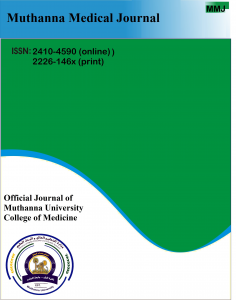 Muthanna Medical Journal
Muthanna Medical JournalResearch Article 
Manhal Ahmed Abdulkader*
Abstract
The objective of this study is to assess the problem of psychological insulin resistant among adults with type 2 diabetes and to identify the attitudinal barriers associated with it. A total of one hundred fifty insulin-naïve-registered patients with type 2 diabetes were involved in this prospective cross-sectional study. Patients’ interview was completed through use of a a pre-tested two parts questionnaire with the national Kurdish language after forward-backward translation from the English language. Cronbach’s alfa test was used for 5 points Likert scale part that involved the attitudinal barriers. A significant P-value considered when P < 0.05. The study depended on SPSS version 22 for data analysis. 56.3 % of patients were unwilling to start insulin when prescribed which represent the prevalence of Psychological Insulin Resistance (PIR) among patients with type 2 diabetes in Duhok. The following socio-demographic characteristics that had significant effects on a patients’ perception towards insulin use in this study were: gender, education level, employment status, and family income. Most of the patients showed a negative attitude towards insulin giving a mean of 3.34 negative beliefs per subject. Of the most commonly expressed negative attitudes were injection fear, the permanent need for insulin therapy, and reduced flexibility or restrictiveness. In conclusion, negative perceptions toward insulin are common among patients with type 2 diabetes, especially for female, illiterate, unemployed and low-income patients. Interventions to raise awareness about such misconceptions are important to reduce PIR and to improve both insulin utilization and diabetes care.
Keywords: Diabetes Mellitus; Insulin; Type 2; Resistance; Psychological